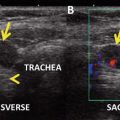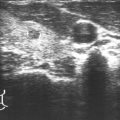© Springer International Publishing Switzerland 2016
David S. Cooper and Cosimo Durante (eds.)Thyroid Cancer10.1007/978-3-319-22401-5_3636. RAI-Refractory, Advanced Differentiated Thyroid Cancer Receiving Tyrosine Kinase Inhibitor Treatment: Checking for Drug-Drug Interactions
(1)
University of Texas M.D. Anderson Cancer Center, Unit 1461, 301402, Houston, TX 77230-1402, USA
Keywords
Thyroid carcinomaKinase inhibitorsDrug-drug interactionsCytochromeQT prolongationTorsades de pointesCase Presentation
A 67-year-old man presented to his local emergency room with complaints of light-headedness and an intermittently irregular heart rhythm, without chest pain or shortness of breath. His past medical history was notable for diagnosis of papillary thyroid carcinoma 5 years previously, treated initially with total thyroidectomy, bilateral modified neck dissection, and adjuvant radioiodine. His post-therapy scan showed minimal uptake in the neck, but a TSH-stimulated thyroglobulin level of 524 ng/mL had subsequently prompted tomographic imaging that revealed bilateral lung lesions compatible with metastatic thyroid carcinoma. With progressive radiographic enlargement over the succeeding 12 months and repeat radioiodine imaging that was negative, he was started on oral therapy with sorafenib for radioiodine-refractory progressive metastases. He initially responded well, but with subsequent progression, his therapy was switched 14 months prior to this emergency room visit to sunitinib. Treatment was complicated by adverse events, including hypertension, diarrhea, and hypomagnesemia. Two weeks before his emergency room visit, he presented to his local primary care physician with acute bronchitis, and antibiotic therapy with clarithromycin was initiated. He returned to his physician 4 days later complaining of worsening diarrhea and was found to have a blood pressure of 170/100 mmHg and a pulse of 96 beats per minute. Verapamil was added to his chronic valsartan therapy, along with an increase in his dosing of diphenoxylate/atropine for his diarrhea. On examination in the emergency room, his pulse was 52 beats per minute and blood pressure 126/62 mmHg. An electrocardiogram revealed sinus bradycardia, with a prolonged QTc of 520 msec. His serum magnesium level was low, 0.9 mg/dL. While preparing an intravenous magnesium infusion, his heart rate was noted to increase acutely to 140 beats per minute, and a transient episode of torsades de pointes was identified on his cardiac monitoring. An infusion of magnesium, 16 mEq, was initiated, and subsequent monitoring demonstrated improvement in the QTc to 470 msec and resolution of his tachyarrhythmia to baseline sinus bradycardia.
Literature Review
With the introduction of multitargeted tyrosine kinase inhibitors (TKIs) for the treatment of individuals with radioiodine-refractory differentiated thyroid carcinoma, new patient safety risks have appeared that require extreme caution on the part of all physicians involved in these patients [1, 2]. These adverse events range from common toxicities, such as diarrhea and skin rashes, to uncommon events that can occasionally be life threatening, such as prolongation of QT intervals that can trigger arrhythmias. Those adverse events that are directly related to the concentration of the drug in circulation can be potentiated by concomitant use of other drugs that alter the metabolic clearance or pharmacokinetics of the TKI itself. Thus, knowledge of the potential for drug-drug interactions is critical whenever medications are prescribed for a thyroid cancer patient being treated for metastatic disease with a TKI. Patient education is also critical, so that the patient is able to alert whoever is prescribing a medication for them to check for possible drug-drug interactions that either increase risk or decrease the effectiveness of the TKI. Most available TKIs used for treating thyroid carcinoma are dosed once or twice per day, with long half-lives that facilitate such dosing schedules . With slow metabolic clearance and often active metabolites, the blood concentration of TKIs can be significantly altered by other agents that interact with the enzymes metabolizing their clearance, thus potentially contributing to concentration-related toxicities. Most TKIs, e.g., sunitinib, are primarily metabolized through hepatic cytochrome P450s such as CYP3A4 [3]. Thus, drugs that activate CYP3A4 might reduce the therapeutic effectiveness of sunitinib by enhancing its metabolic clearance, whereas drugs that inhibit the cytochrome might be anticipated to increase susceptibility to toxic side effects. Further, some TKIs carry the potential to inhibit other drug-metabolizing enzymes, thus introducing the potential for the TKI to interfere with metabolism of other therapies.
The potential to prolong the QT interval and increase risk for torsades de pointes has been a key focus for studies of drug-drug interactions for multitargeted TKIs relevant to thyroid carcinoma [4]. The interval, defined as the time between the beginning of the QRS complex and the end of the T wave, is highly sensitive to inhibition of the myocyte potassium channel associated with human ether-a-go-go-related gene (hERG) that mediates ventricular repolarization during phase 2–3 of the action potential [5]. No single mechanism has emerged to explain the ability of multitargeted TKIs to inhibit the hERG, and it appears to vary among the different TKIs themselves. However, alterations in the function of numerous intracellular protein kinases including PI3K, AKT, and protein kinase A that function downstream from the tyrosine kinases affected by TKIs have all been implicated to contribute [5]. Electrolyte abnormalities , such as hypokalemia and hypomagnesemia which can commonly result from TKI-induced diarrhea, may also independently contribute to a risk of QT prolongation and torsades de pointes.
The magnitude of the effect of TKIs on significant QT prolongation was evaluated in a trial-level meta-analysis of placebo-controlled studies that included EKG monitoring while on therapy with any of the following drugs: sunitinib, sorafenib, pazopanib, axitinib, vandetanib, cabozantinib, ponatinib, and regorafenib; note that all of the first six drugs have been formally studied in phase II or phase III trials in radioiodine-refractory differentiated thyroid cancer [4]. More than 4 % of patients experienced any grade of prolongation of the QT interval during therapy with a multitargeted TKI, in contrast with 0.25 % for those untreated, and high-grade prolongation was 2.7-fold more likely in the TKI-treated patients. The risks were highest for patients treated with sunitinib or vandetanib, and importantly a significant correlation was noted between drug dosing and frequency of QT prolongation.
Stay updated, free articles. Join our Telegram channel

Full access? Get Clinical Tree






